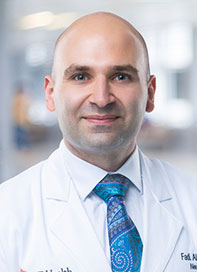The most effective treatment begins with an accurate diagnosis. Our brain and spine specialists combine their experience and expertise with the most advanced technology available to diagnose your condition correctly and quickly. For many brain and spine conditions, time is a critical factor. That’s why University Health specialists are on-site 24/7 to read diagnostic tests and provide services for adults and children.
Our expertise and sophisticated technology give you access to San Antonio’s highest level of diagnostics for all brain and spine conditions. As South Texas’ premier provider of brain and spine services, we also provide the most advanced and specialized diagnostics services for stroke and epilepsy in San Antonio.
Expertise and Advanced Technology
Accurate diagnosis begins with an in-depth health history and physical evaluation. Certain conditions, such as some movement disorders, can only be diagnosed based on your medical history and a neurological examination.
For other brain and spine conditions, our specialists have access to a wide range of sophisticated imaging technology including:
- Bone scan
- Bone density scan
- Computerized axial tomography (CAT) scan
- DaTscan imaging
- DTI (diffusion tensor imaging) tractography
- Electroencephalogram (EEG)
- Electromyogram and nerve conduction studies (EMG/NCS)
- Fluoroscopy
- Functional MRI
- Magnetic resonance imaging (MRI)
- Ultrasound
- X-ray


